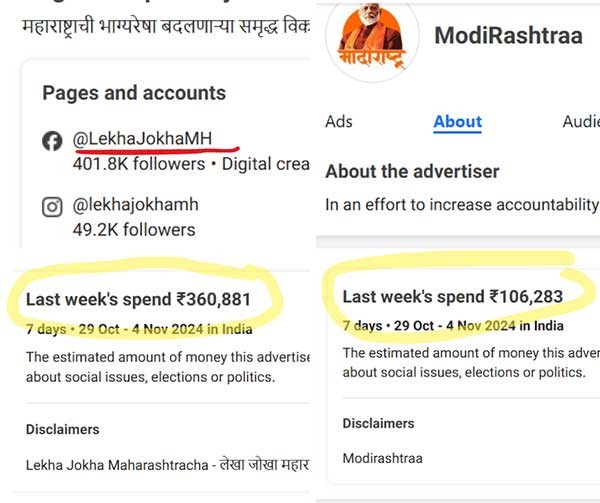Maharashtra Elections: Proxy pages become battlegrounds for political parties
Proxy pages can change voter perceptions but have no official ties to the political parties they endorse, which has sparked transparency concerns
Proxy pages can change voter perceptions but have no official ties to the political parties they endorse, which has sparked transparency concerns

Proxy pages, often faceless and untraceable, have become a staple in Maharashtra ’s digital campaign landscape, allowing parties to amplify their messages without overtly associating with the content.
Shudeep Majumdar, Co-founder & CEO of Zefmo, estimates that digital campaign spending in Maharashtra could exceed Rs 100 crore. The state is expected to account for 10–15% of the potential Rs 500-crore national digital campaign budget, with political parties directing a significant portion of their funds towards proxy ads.
Beyond just ads
While political parties can rely on official pages, many are choosing to operate through proxy pages that avoid official affiliation. This tactic has stirred concerns over transparency, as these pages avoid accountability while shaping perceptions.
Pages like "Lekha Jokha Maharashtracha," for instance, have spent upwards of Rs 13 lakh on ads in just one month. With Meta’s ad transparency tool, it’s possible to track spending to some extent; however, the real source of funds and connections to political entities remain murky.

Anup Sharma, a PR and Strategic Communications Consultant advising senior leaders in Maharashtra and Jharkhand, notes a seismic shift in campaign strategies, emphasising that digital technology has become the “biggest disruptor” in election campaigns. According to Anup, professional campaign managers now leverage sophisticated micro-targeting techniques, using data from platforms like Meta to reach voters based on demographics, interests, and even locations.
“Political parties have always relied on the power of media as it helps build perception, but today (digital) media is not only acting as a medium but is defining the message. With widespread smartphone access and affordable data, reaching voters across India has become relatively easy. A smartphone equipped with cheap data and social media has empowered everyone to become media content creators and also distributors,” says Sharma.
When exchange4media reached out to Meta, their spokesperson didn’t disclose figures on the number of proxy ads removed so far, but the platform insists it is committed to transparency and requires political advertisers to go through a strict authorisation process.
According to a Meta Ad Library report, political ads in Maharashtra have seen unprecedented spending, with over Rs 8.5 crore spent between 9 September and 8 October 2024. The Mahayuti alliance accounted for Rs 2.49 crore, while the Maha Vikas Aghadi constituents spent Rs 24.59 lakh, showing just how fiercely these digital battles are being fought.
The appeal of micro targetting
According to Zefmo’s latest Influencer Report, 78% of people believe influencer marketing is now a primary tool for political awareness. Thirty-seven per cent of influencers have reported a rise in non-commercial partnerships with government bodies focused on public awareness.
Zefmo CEO Shudeep told exchange4media that the political parties who are collaborating with influencers are focusing on policy discussions rather than promoting specific political figures.
“More and more local influencers are being tapped for their regional appeal, which is especially impactful during state elections. This strategy also helps political parties to reach specific voter demographics in key constituencies, making digital outreach highly effective,” he adds.
Congress vs BJP
The two alliances are waging a fierce digital battle, each driving sharply contrasting narratives through social media ads that spotlight their competing visions for Maharashtra .
In a recent Congress Maharashtra election ad campaign, the party launched three video ads targeting BJP’s Mahayuti alliance on issues like women’s safety, highlighting specific cases to create an emotional resonance with voters. One Congress ad accused the BJP of moving projects worth Rs 7.5 lakh crore to Gujarat, questioning the loyalty of BJP towards Maharashtra ’s interests.
Although the ad featured humour and portrayals of Eknath Shinde and other opposition party leaders, it struggled to reach audiences effectively.
*Injustice to Farmers - Ata Chalnar Nahi: Maharashtra Congress launches a hard-hitting ad targeting the NDA over lack of support to farmers*
— abhinav goel (@1987_abhinav) November 2, 2024
The Maharashtra Congress launches another ad - this time targeting the Mahayuti over failure to support farmer issues. Highlighting the pic.twitter.com/4D3hZpp5Fd
Meanwhile, the BJP countered with an Instagram campaign focused on Maharashtra 's infrastructure achievements. Highlighting projects like the Bandra-Worli Sea Link, the BJP's messaging aimed to reinforce the narrative of progress under their governance. This single BJP Maharashtra ad garnered 19.8K likes on Instagram in one day and 1,243 shares, which can be seen as a significant success.
Maharashtra ’s political candidates come with significant financial clout. According to recent data, 93% of the 272 sitting MLAs are crorepatis, with parties including BJP, NCP, and Congress leading the list. Out of 103 BJP MLAs, 98 declared assets over Rs 1 crore. This suggests that for many candidates, the high expenditure on digital and traditional campaigning is less a burden and more an investment in their political reach.
A new tool in town
As political campaigns become more sophisticated, the ethics and transparency around proxy advertising become critical. The ECI has increased scrutiny of political ads, but it remains challenging to regulate proxy ads, especially as political parties avoid accountability by not formally associating with these pages. Proxy ads allow them to employ content that may skirt communal sensitivities and attack opponents indirectly, all while remaining technically outside party finances.
The stakes are high in Maharashtra , and with Rs 15,647 crore spent nationally by political parties from FY14 to FY23, digital campaigning is only set to grow.